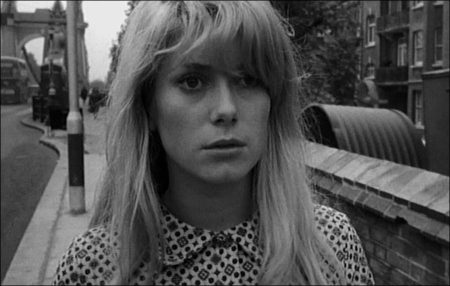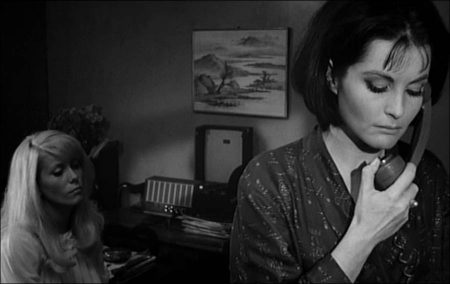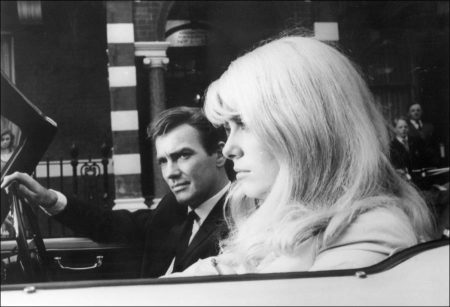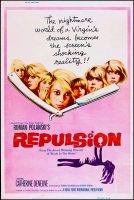Taglines: The nightmare world of a virgin’s dreams becomes the screen’s shocking reality!
Repulsion movie storyline. In London, Belgian immigrant Carol Ledoux shares an apartment with her older sister Helen, and works as a manicurist at a beauty salon. Helen uses the word “sensitive” to describe Carol’s overall demeanor, which is almost like she walks around in a daze, rarely speaking up about anything. When she does speak up, it generally is about something against one of those few issues on which she obsesses, such as Helen’s boyfriend Michael’s invasion of her space at the apartment.
That specific issue may be more about men in general than just Michael’s actions, as witnessed by Carol being agitated by hearing Helen and Michael’s lovemaking, and she not being able to rebuff the advances effectively of a male suitor, Colin, who is infatuated with her. One of those other obsessive issues is noticing cracks and always wanting to fix them.
While Helen and Michael leave on a vacation to Pisa, Italy, Carol chooses largely to lock herself in the apartment, ditching work. There, she is almost hypnotized by her solitude, which leads to her mental state deteriorating as those obsessions come to the fore. She quickly descends into madness, which ultimately also affects those that are trying to get in touch with her.

Repulsion is a 1965 British psychological horror film directed by Roman Polanski and based on a story by Polanski and Gérard Brach, who wrote the screenplay with David Stone. It stars Catherine Deneuve, Ian Hendry, John Fraser, Patrick Wymark, and Yvonne Furneaux. Shot in London, it is Polanski’s first English-language film and second feature-length production, following Knife in the Water (1962).
The main character, played by Catherine Deneuve, is Carol Ledoux, a beautiful yet withdrawn woman, who finds men and sexual advances repulsive. She lives in an apartment with Helen, her older sister, who always has her lover Michael over. After the two go on a vacation together, she is left alone in the apartment, becoming ever more isolated and lost in her psychological detachment from reality. The film focuses on the point of view of Carol and her vivid hallucinations and nightmares as she comes into contact with men and their desires for her.
The film debuted at the 1965 Cannes Film Festival before receiving theatrical releases internationally. Upon its release, Repulsion received considerable critical acclaim and currently is considered one of Polanski’s greatest works. The film was nominated for a BAFTA Award for Gilbert Taylor’s cinematography.
The film is unusual for being a scary movie that features a female killer. It explores the repulsion Carol feels about human sexuality in general and her suitors’ pursuit of her in particular. It has been suggested that the film hints that her father may have sexually abused her as a child, which is the basis of her neuroses and breakdown. Other critics have noted Carol’s repeated usage of items related to her sister’s boyfriend Michael, as well as noting that his presence greatly provokes Carol at the beginning of the film.
The film also approaches the theme of boundary breaking, with Tamar McDonald stating that she saw Carol as refusing to conform to the expected “path of femininity”. It increasingly adopts the perspective of its protagonist. The dream sequences are particularly intense. Repulsion was the first installment in Polanski’s “Apartment Trilogy”, followed by Rosemary’s Baby (1968) and The Tenant (1976), both of which are horror films that also take place primarily inside apartment buildings.
Repulsion (1965)
Directed by: Roman Polanski
Starring: Catherine Deneuve, Ian Hendry, John Fraser, Patrick Wymark, Yvonne Furneaux, Valerie Taylor, James Villiers, Helen Fraser, Hugh Futcher, Imogen Graham, Monica Merlin
Screenplay by: Roman Polanski, Gérard Brach, David Stone
Cinematography by: Gilbert Taylor
Film Editing by: Alastair McIntyre
Art Direction by: Seamus Flannery
Makeup Department; Gladys Leakey, Tom Smith
Music by: Chico Hamilton
MPAA Rating: None.
Distributed by: Compton Films
Release Date: June 11, 1965 (UK), October 3, 1965 (US)
Views: 170


